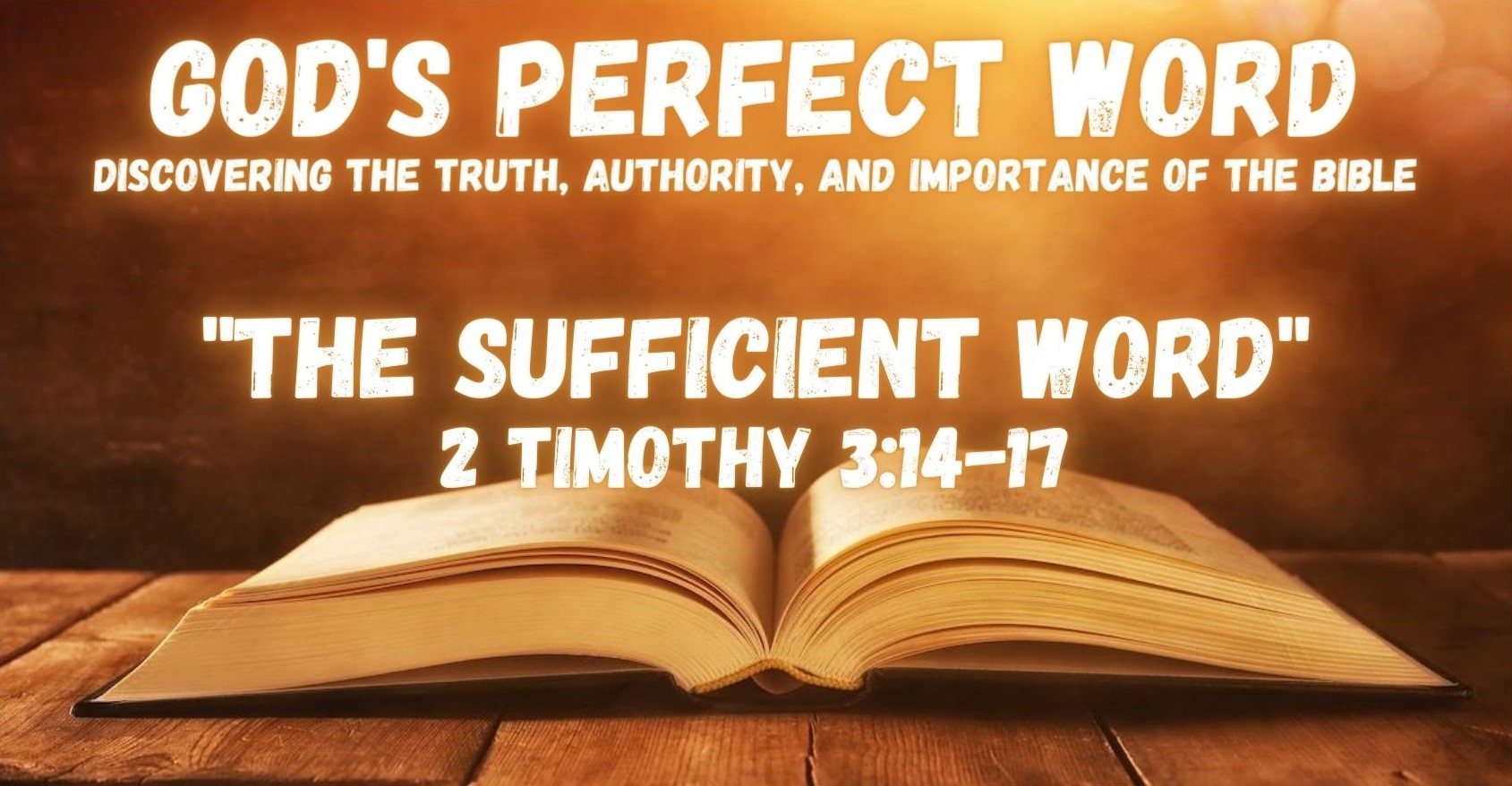2 Timothy 3:14-17
14 But continue thou in the things which thou hast learned and hast been assured of, knowing of whom thou hast learned them; 15 And that from a child thou hast known the holy scriptures, which are able to make thee wise unto salvation through faith which is in Christ Jesus.b16 All scripture is given by inspiration of God, and is profitable for doctrine, for reproof, for correction, for instruction in righteousness: 17 That the man of God may be perfect, thoroughly furnished unto all good works.
God’s Word is sufficient. In Deuteronomy 8, Moses reminds the children of Israel of how God had tested them and provided for them during their forty years of wondering in the wilderness. It was so that they might come to understand that, “man doth not live by bread only, but by every word that proceedeth out of the mouth of the Lord doth man live” (Deuteronomy 8:3). When facing forty days of temptation in the wilderness, Jesus, the greater Israel, was tempted by the devil to command stones to become bread. In response, He quoted this passage from Deuteronomy and said, “It is written, Man shall not live by bread alone, but by every word that proceedeth out of the mouth of God” (Matthew 4:4). The purpose of this Scripture in both places is to demonstrate the sufficiency of God’s Word and His promises.
It is a commitment to the sufficiency of Scripture that we come to in this text of 2 Timothy 3:14-17. The Apostle Paul wrote some of his final words to Timothy, his son in the faith. He chose, under inspiration of the Holy Spirit, to remind Timothy of what God’s Word had meant in Timothy’s life and how it was sufficient for everything that Timothy would need to do as a good servant of Jesus Christ. From this text, we can draw out three essential things that the Word of God is absolutely sufficient for.
God’s Word is sufficient to lead me to salvation. Paul tells Timothy to remember the things from the Bible that his mother and grandmother had taught him and demonstrated for him in his upbringing (2 Timothy 1:5). He reminds Timothy that the Scriptures were what led him to salvation. The Bible contains the entire redemptive plan of God from Genesis to Revelation. We see God’s good creation corrupted by sin and the fall of man in the Garden of Eden. We see the promises of God to restore what was lost in the fall through sending His only begotten Son into the world to pay the price for man’s sin to reconcile us to God. In the pages of Scripture, one can see the holiness and sovereignty of God, the fallenness and sinfulness of all of mankind, the saving grace of the gospel provided in Jesus’ substitutionary death on the cross, and the eternal life available because He rose from the dead. The Bible tells me everything that I need to know to be reconciled to God and saved from my sin.
God’s Word is also sufficient to teach me about God. One mistake many of us make in reading and understanding the Bible is that we try to see the Bible as a book about us. The Bible is not about us, even though it says quite a bit about mankind. It is a book about God. It is God’s revelation of Himself to mankind. He has spoken and spoken clearly and His Word has been perfectly given and preserved through the years. Paul says that “All Scripture is given by inspiration of God.” “Inspiration” means “God-breathed.” The Bible was breathed out by God. The process is described in 2 Peter 1:20-21 in which the Holy Spirit “moved” the authors of Scripture to write exactly what God wanted them to write. Since Scripture came from God, it reveals to us the very nature and character of God. Since the Scriptures are true, we can know that God is truthful and visa-versa. God desires for us to know Him. This is why He has spoken. The Scriptures are the sufficient source for knowing our God.
Lastly, God’s Word is sufficient to equip believers for obedience. The Scriptures are the source of “doctrine” (teaching), “reproof” (rebuke), “correction,” and “instruction in righteousness.” The Bible tells us what we should do and shouldn’t do. It tells us what we shouldn’t be and what we should be. It does so perfectly. The Bible does these things to make us “perfect” (competent or able) and “thoroughly furnished” (fully equipped) for “all good works.” “All good works” means that there is no good work for which the Bible, under the power of the Holy Spirit, cannot equip us for as Christians. It gives us all that we need to be obedient followers of Christ. This is why Jesus said, “If ye continue in My Word, then are ye my disciples indeed” (John 8:31).
One of the great debates among Christians is not whether the Bible is true. It is not whether the Bible is useful. It is not whether the Bible is the Word of God. Instead, the issue facing the church, even conservative Christians today, is “Is the Bible sufficient?” Is Scripture enough? The Apostle Paul seemed to believe it was. The temptation we face is to try to add to God’s Word, replace it, water it down, or enhance it. God’s Word stands on its own. It is sufficient. It is enough. The real issue at hand is, “Will I submit to this by faith?” “Will I simply let God’s Word be the authority in my life and believe it to be sufficient?”






